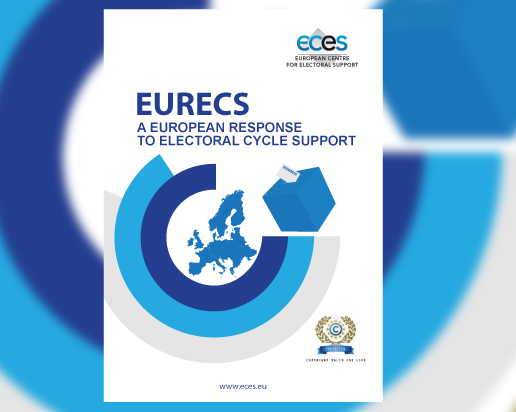The European Response to the Electoral Cycle (EURECS) approach
 This action will be implemented based on the use of the "European Response to the Electoral Cycle (EURECS)" approach, developed and copyrighted by ECES - whose main objective is to offer the European Union, its Member States, and beneficiary countries an innovative electoral and democratic support mechanism to implement projects and programmes in line with EU values and policies. The mechanism is designed to help prevent, mitigate, and manage election-related conflicts in line with international obligations, standards, and political commitments.
This action will be implemented based on the use of the "European Response to the Electoral Cycle (EURECS)" approach, developed and copyrighted by ECES - whose main objective is to offer the European Union, its Member States, and beneficiary countries an innovative electoral and democratic support mechanism to implement projects and programmes in line with EU values and policies. The mechanism is designed to help prevent, mitigate, and manage election-related conflicts in line with international obligations, standards, and political commitments.
EURECS strategy in Bolivia will take into consideration the following aspects:
- The recommendations from the EU EOM Final Report on the 2009 Presidential and General Elections and the EU Reinforced Election Expert Mission Final Report on the 2020 General Elections in formulating and implementing activities supporting a given electoral cycle. Liaise constantly with the EU Parliament, European Commission, and EEAS services dealing with Election Observation at the Brussels level.
- All phases of the electoral cycle for the upcoming 2025 General Elections will be coordinated with other election assistance providers. Activities will be implemented to support various electoral stakeholders, including the OEP, the TSE, the 9 TEDs, political entities, media, civil society, etc.
- The action will consider other programmes and initiatives carried out both within the country and across South America. It will incorporate alignment with EU-related initiatives such as the Multi-annual Indicative Programme (MIP) 2021–2027 for Bolivia, prioritising the area of governance and human rights, specifically under Sector 1: Rule of Law, Democracy, and Human Rights. Additionally, the action will also align with the Joint European Strategy for Bolivia (JES) 2022–2025.
- The need for interdisciplinary teams with skills adapted to the needs of the project by adopting a joint human resource plan submitted to the EU services prior to the signature of the contracts.
- Rapidly mobilise and ensure the deployment of highly qualified expertise with experience in Bolivia, the region, and internationally in electoral processes, capacity development, and prevention and mitigation of electoral-related violence.
EURECS is built around three main pillars: operational cycle and project management tools, programmatic and capacity-building tools, and analysis and knowledge management tools.
The analytical aspect of EURECS is based on three main methodologies: peace mediation in electoral processes, electoral political economy analysis (EPEA), and electoral security threat assessment (ESTA). These methodologies provide a comprehensive and nuanced understanding of the electoral landscape, its administration, and the complexity of possible influences on the security and stakeholder mapping of the country.
The project will seek to support the organisation of inclusive, transparent, and peaceful elections in Bolivia through mediation and dialogue initiatives, awareness-raising, and prevention and mitigation of violence.

